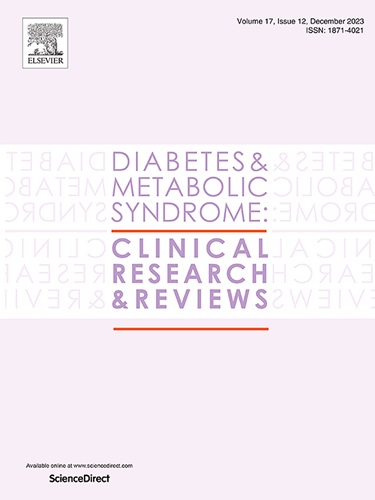了解印度年轻人中的肥胖症:焦点小组研究
IF 3.4
Q1 ENDOCRINOLOGY & METABOLISM
Diabetes & Metabolic Syndrome-Clinical Research & Reviews
Pub Date : 2024-09-01
DOI:10.1016/j.dsx.2024.103121
引用次数: 0
摘要
导言:本研究旨在了解印度年轻人(YAs)对肥胖的风险因素和后果、减肥的障碍和动力以及体重管理的潜在解决方案的了解和认识。方法:通过滚雪球和有目的的抽样,在肥胖的 YAs(18-30 岁)中采用归纳法进行了六次焦点小组讨论。采用了最大限度多样性的原则,以建立一个有关青年肥胖症的多样而广泛的信息库。QSR国际公司使用NVivo 1.0对讨论进行了录音和逐字转录,以便从讨论中生成代码、次主题和主题。结果在招募的30名青年学生(平均年龄为24.7 ± 2.84岁)中,近一半来自高收入群体(56.6%),并具有研究生学历(53.3%)。关键主题包括需要提高不同社会阶层对肥胖风险因素和后果的认识。外貌是减肥的主要动力,其次是身体耐力和社会支持。主要障碍包括缺乏精力、时间、动力、改变生活方式、容易获得不健康食品、工作承诺和工作场所文化。结论发展中国家的青年学生在肥胖症发展和管理的不同方面所面临的挑战是独特的,与其他人群不同。个性化体重管理模块可能有助于管理这一群体的肥胖症。本文章由计算机程序翻译,如有差异,请以英文原文为准。
Understanding obesity among young adults in India: A focus group study
Introduction
The study aims to understand the knowledge and awareness about risk factors and consequences of obesity, barriers and motivators to weight loss, and potential solutions for weight management among young adults (YAs) in India.
Method
Six focus group discussions were conducted with an inductive approach among obese YAs (18–30 years) recruited through snowball and purposive sampling. The principle of maximum diversity was used to build a pool of varied and extensive information regarding obesity in YAs. The discussions were audio-recorded and transcribed verbatim using NVivo 1.0 by QSR International to generate codes, subthemes, and themes from the discussions.
Result
Among the thirty recruited YAs (mean age 24.7 ± 2.84 years), nearly half were from a high-income group (56.6 %) and had postgraduate education (53.3 %). Key themes included the need for increased awareness about obesity risk factors and consequences across different societal levels. Physical appearance was the primary motivator for weight loss, followed by physical endurance and social support. Major barriers included lack of energy, time, motivation, lifestyle changes, easy access to unhealthy foods, work commitments, and workplace culture. A holistic approach involving dietary changes, physical activity, and educational and policy reforms was suggested as potential solutions.
Conclusion
The challenges faced by YAs in developing countries regarding different aspects of the development and management of obesity are unique and different from the other population groups. Individualized weight management modules may be useful for managing obesity in this group.
求助全文
通过发布文献求助,成功后即可免费获取论文全文。
去求助
来源期刊

Diabetes & Metabolic Syndrome-Clinical Research & Reviews
ENDOCRINOLOGY & METABOLISM-
CiteScore
22.90
自引率
2.00%
发文量
248
审稿时长
51 days
期刊介绍:
Diabetes and Metabolic Syndrome: Clinical Research and Reviews is the official journal of DiabetesIndia. It aims to provide a global platform for healthcare professionals, diabetes educators, and other stakeholders to submit their research on diabetes care.
Types of Publications:
Diabetes and Metabolic Syndrome: Clinical Research and Reviews publishes peer-reviewed original articles, reviews, short communications, case reports, letters to the Editor, and expert comments. Reviews and mini-reviews are particularly welcomed for areas within endocrinology undergoing rapid changes.
 求助内容:
求助内容: 应助结果提醒方式:
应助结果提醒方式:


